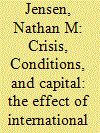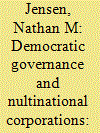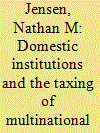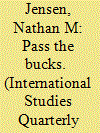|
|
|
Sort Order |
|
|
|
Items / Page
|
|
|
|
|
|
|
| Srl | Item |
| 1 |
ID:
052176


|
|
|
|
|
| Publication |
April 2004.
|
| Summary/Abstract |
A selection model for 68 countries between 1970 and 1998 is used to test the impact of International Monetary Fund(IMF) programs on international capital markets and examine how agreements are perceived by multinational investors. Results reveal that even after controlling for the factors that lead countries to seek IMF support, IMF agreements lead to lower levels of foreign direct investment (FDI). Countries that sign IMF agreements, ceteris paribus, attract 25% less FDI inflows than countries not under IMF agreements.
|
|
|
|
|
|
|
|
|
|
|
|
|
|
|
|
| 2 |
ID:
051447


|
|
|
| 3 |
ID:
123616


|
|
|
|
|
| Publication |
2013.
|
| Summary/Abstract |
Political scientists have examined how domestic politics and the competition for international capital affect the setting of national tax rates. In this paper, I explore how political institutions, specifically the level of democracy, affect firm-level taxation across the world. I argue that electoral competition leads democratic governments to higher levels of taxation on firms. Using a data set on firm tax payments on the foreign affiliates of US multinational corporations from the US Bureau of Economic Analysis, I show that there are large variations within countries on the tax burdens faced by firms that are not explained by national tax rates. I find evidence that the mobility of the specific investment project, the types of spillovers these investments provide to a community, and attributes of the parent firm are all important determinants of taxation. While firm-level factors clearly affect corporate taxation, I argue that democratic institutions limit the offering of tax incentives and generate electoral benefits to policing tax avoidance by multinational corporations. After controlling for parent firm and foreign affiliate-level factors, I find that democratic countries generate as much as 26% more tax revenues from multinational corporations relative to authoritarian countries.
|
|
|
|
|
|
|
|
|
|
|
|
|
|
|
|
| 4 |
ID:
126548


|
|
|
|
|
| Publication |
2013.
|
| Summary/Abstract |
Political scientists have examined how domestic politics and the competition for international capital affect the setting of national tax rates. In this paper, I explore how political institutions, specifically the level of democracy, affect firm-level taxation across the world. I argue that electoral competition leads democratic governments to higher levels of taxation of firms. Using a data set on firm tax payments on the foreign affiliates of US multinational corporations from the US Bureau of Economic Analysis, I show that there are large variations within countries on the tax burdens faced by firms that are not explained by national tax rates. I find evidence that the mobility of the specific investment project, the types of spillovers these investments provide to a community, and attributes of the parent firm are all important determinants of taxation. While firm-level factors clearly affect corporate taxation, I argue that democratic institutions limit the offering of tax incentives and generate electoral benefits to policing tax avoidance by multinational corporations. After controlling for parent firm and foreign affiliate-level factors, I find that democratic countries generate as much as 26% more tax revenues from multinational corporations relative to authoritarian countries.
|
|
|
|
|
|
|
|
|
|
|
|
|
|
|
|
| 5 |
ID:
158375


|
|
|
|
|
| Summary/Abstract |
International relations scholarship has made great progress on the study of compliance with international agreements. While persuasive, most of this work has focused on states’ de jure compliance decisions, largely excluding the de facto behavior of nonstate actors whose actions the agreement hopes to constrain. Of particular interest has been whether the OECD Anti-Bribery Convention (ABC) might reduce the propensity of multinational corporations (MNCs) to bribe officials in host countries through its mechanisms of extraterritoriality and extensive peer review. Unfortunately, research is hampered by reporting bias. Since the convention raises the probability of investors’ punishment for bribery in their home countries, it reduces both the incentives for bribery and willingness to admit to the activity. This generates uncertainty over which of these incentives drives any correlation between signing the convention and reductions in reported bribery. We address this problem by employing a specialized survey experiment that shields respondents and reduces reporting bias. We find that after the onset of Phase 3 in 2010, when the risk of noncompliance increased for firms subject to the OECD-ABC, those MNCs reduced their actual bribery relative to their nonsignatory competitors.
|
|
|
|
|
|
|
|
|
|
|
|
|
|
|
|
| 6 |
ID:
134513


|
|
|
|
|
| Summary/Abstract |
Both countries and subnational governments commonly engage in competition for mobile capital, offering generous incentives to attract investment. Existing economics research has suggested that these tax incentives have a limited ability to affect investment patterns and are often excessively costly when measured against the amount of investment and jobs created. In this paper, we argue instead that the “competition” for capital can be politically beneficial to incumbent politicians. Building off work on electoral pandering, we argue that incentives allow politicians to take credit for firms' investment decisions. We test the empirical implications of this theory using a nationwide Internet survey, which employs a randomized experiment to test how voters evaluate the performance of incumbent US governors. Our findings illustrate a critical political benefit of offering such incentives. Politicians can use these incentives to take credit for investment flowing into their districts and to minimize the political fallout when investors choose to locate elsewhere.
|
|
|
|
|
|
|
|
|
|
|
|
|
|
|
|
| 7 |
ID:
082934


|
|
|
|
|
| Publication |
2008.
|
| Summary/Abstract |
There is a substantial literature that has linked past acts of violence to investment. In this article, we argue that the appropriate mechanism linking violence to investment is investor perceptions of risk, in which forward-looking investors attempt to predict the likelihood of future political violence. We take advantage of a new data source-the price paid by investors to purchase risk insurance coverage-to more accurately capture how risk is assessed in investment decision making. Building on the civil war literature, we offer a broad explanatory model of variation in violence risk in the developing world. After controlling for recent past experiences with violence, we find that wealth and democracy significantly affect the perception of risk, whereas demographic factors and natural resource endowments have limited, if any, influence.
|
|
|
|
|
|
|
|
|
|
|
|
|
|
|
|
|
|
|
|
|